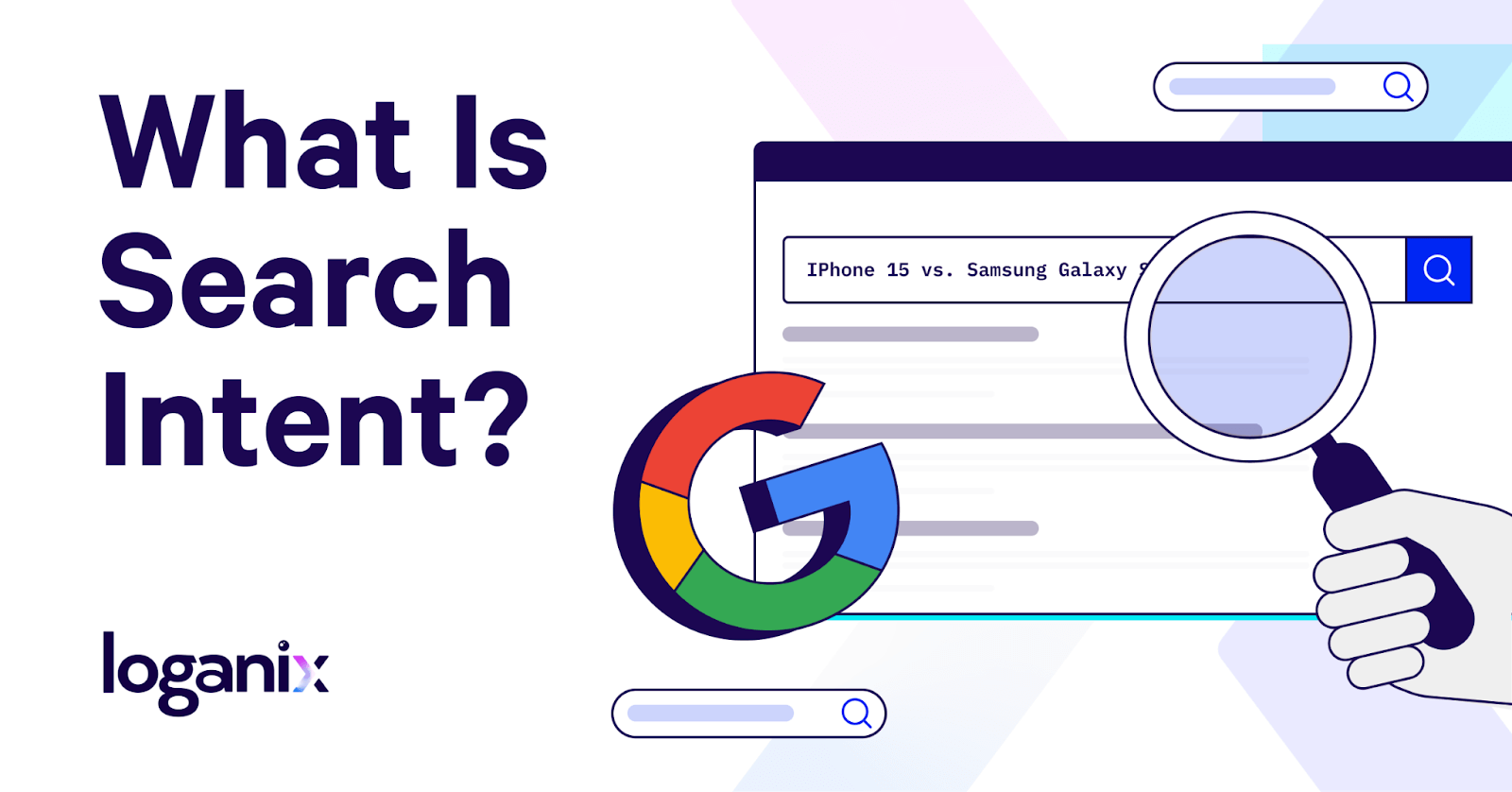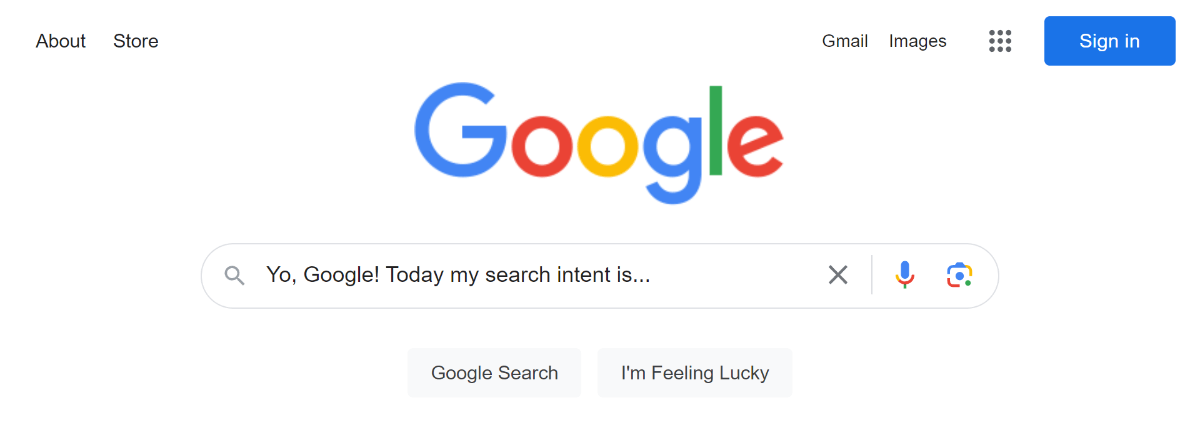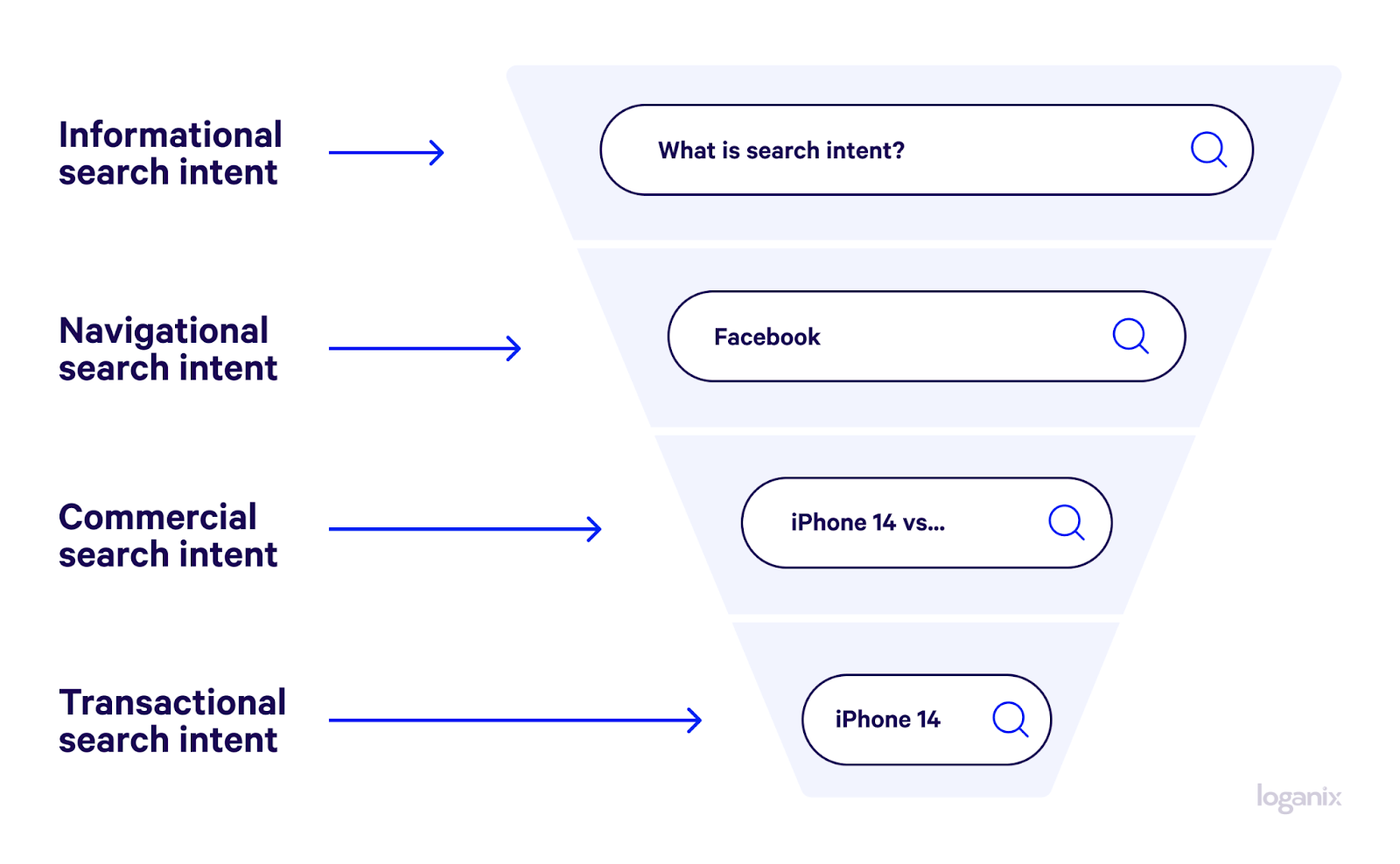What Is Search Intent?

Hand off the toughest tasks in SEO, PPC, and content without compromising quality
Explore ServicesImagine yourself as a librarian. Not just any librarian, but one in charge of the world’s most comprehensive library—Google. Your job? To provide every visitor with the most relevant and valuable information based on their request or, as it’s known in the search engine optimization (SEO) world, their search query.
But, hold up, what is search intent?
Read on as we
- define what search intent is,
- why it’s become the beating heart of SEO,
- and provide the insights you need to master the science of search intent.
What Is Search Intent?

Search intent, also referred to as keyword intent or searcher intent, refers to the underlying goal a user aims to achieve when typing a query into a search engine. More than just an assortment of words, each search query carries a purpose.
To determine this purpose, let’s put on our psychologist hats. Search intent taps into users’ motivation, behavior, and needs, adding a deeper dimension to our understanding of online user activity.
Understanding the psychology behind search intent is akin to understanding the “why” behind each search. It’s about deciphering the motivation driving the search. In other words, when determining a user’s search intent, you could ask yourself the following questions: 1) What does the user hope to gain from the search? 2) What problem are they trying to solve? 3) Where are they in their buyer’s journey?
This psychological insight is vital. It allows for a more nuanced and empathetic approach to SEO, ensuring that your digital content isn’t merely optimized for search engines but for human needs and desires as well.
Learn more: SEO glossary 250+ terms explained.
Why is Search Intent Important?
We now know what search intent is, but why is it so important?
Let’s take a little look-see.
Aligning with Google’s #1 Goal
Google’s job, numero uno, is to act as a problem solver, to satisfy user intent, and to provide its users with the most relevant, valuable, and comprehensive answers to their search queries. Why? Google’s whole business model, not to mention its billion dollars worth of annual profits, hinges on trust. The better the search engine is at providing credible, accurate, and helpful answers, the more people use the platform and the more ad revenue they generate.
Fail, and their users will switch to another search engine, putting them out of business. This is precisely why Google’s algorithms are continually tweaked and refined—to prioritize content that satisfies user intent. So, if you can produce content that aligns with Google’s goal, they’ll rank it.
Simple as that, right? Conceptually, sure. In reality, unfortunately, it’s not always that simple. There’s a lot more to it than that. Nevertheless, the point still stands. If you can align yourself with search intent, you’re giving your content the perfect headstart on the search engine results pages (SERPs), particularly over competitor content that doesn’t satisfy a search query.
Impact on SEO Performance
As we just hinted at, search intent and the overall performance of your SEO strategy are intrinsically linked. Produce high-quality content that matches user intent, and the higher the likelihood Google will rank it. But it doesn’t stop there. Satisfying search intent also increases the likelihood of your content being selected for coveted positions like the Featured Snippets or the “People also ask” boxes, further enhancing visibility and click-through rates.
User Satisfaction and Retention
Matching search intent does more than simply improve rankings and online visibility. It also creates a positive user experience. Obviously, it is something that your visitors will appreciate and, perhaps less intuitively, something Google appreciates too. So much so that Google has made user experience (UX) a ranking factor.
In other words, when users find exactly what they’re looking for on your website, they’re likely to spend more time on your site and explore further. This reduces bounce rates and increases dwell time—two critical user interaction signals that Google considers when ranking web pages. Plus, satisfying search intent fosters trust and encourages repeat visits, contributing to user retention.
Conversion Optimization
And the most important part of all? Understanding and satisfying search intent can significantly boost the amount of paying customers you attract to your website and business and, consequently, increase conversion rates.
When your content accurately matches the user’s intent—be it learning more about a topic, comparing products, or making a purchase—it’s more likely to guide them along the sales funnel toward a conversion. So, by meeting users’ needs and providing value, you create opportunities for engagement, subscription, and sales.
The Four Cardinal Types of Search Intent

We’d be remiss if we didn’t tackle the different types of search intent. Typically, search intent comes in four forms: informational, navigational, transactional, and commercial.
- Informational search intent pertains to queries where users seek knowledge or answers. For instance, your likely path here, using the search query (or something similar) “what is search intent,” indicates an informational intent.
- Navigational search intent involves queries where users aim to reach a specific website or page. For instance, typing “Facebook” into a search engine is an example of navigational intent.
- Commercial search intent relates to searches where users are considering a purchase but are still in the process of research. For example, a search query like “iPhone 14 vs. Samsung Galaxy S23” indicates commercial intent.
- Transactional search intent is associated with, you guessed it, queries where the intent is to complete a purchase or transaction. Searching for “iPhone 14” signals transactional intent to search engines like Google.
Delving Deeper: Understanding Keyword Intent
A journey of a thousand miles begins with a single step, and in terms of search engines, that first step is often a keyword. But what’s the connection between keywords and search intent? Let’s find out.
Unraveling the Relationship Between Keywords and Search Intent
Keywords aren’t just words. They signal to a search engine a user’s intent. And if you can make the connection between the keyword and intent, understand what a search is looking for, and interpret their motives and goals, you’re well on your way to creating content that directly addresses them.
The Role of Keywords in Signaling User Intent
Okay, but how do we actually go about discerning intent? Keywords signal user intent in several ways. They may indicate a user’s stage in the buying cycle—informational, navigational, commercial, transactional—reveal the type of content a searcher is looking for—written content, reviews, videos—or even suggest a location-based search—local searches for local goods or services.
Strategies for Inferring Intent from Keyword Analysis
And what might this look like? Well, it requires us to look beyond the words’ literal meaning and grasp the search’s deeper implications. Here are a few strategies:
- Look for modifiers. Words like “best,” “review,” “buy,” “cheap,” or “near me” can provide strong clues about a user’s intent.
- Consider query length. Longer queries often indicate a more specific intent, like making a purchase, while shorter ones may be more general or exploratory.
- Examine SERP features. The types of results and features (organic listings, ads, shopping results, or local pack) displayed by Google for a particular keyword can offer clues about the dominant search intent.
- Use keyword research tools. Tools like Google Trends, Keyword Planner, or paid tools like Ahrefs, Moz, and SEMrush provide additional insights into search volumes, trends, and competition—helping to further inform your understanding of user intent.
So, by harnessing the power of keywords, we can peek into the minds of our users, anticipate their needs, and craft content that not only resonates with them but also aligns with their search journey.
Conclusion
Are you ready to propel your SEO beyond the ordinary and make every search query matter? At Loganix, our seasoned team of SEO experts will help you unlock the mystery of search intent, tailoring your content strategy to echo your audience’s needs and desires.
🚀 With our comprehensive suite of SEO services, you’ll not only decode the language of your customer’s searches but transform it into a powerful tool to drive traffic and engagement. 🚀
Hand off the toughest tasks in SEO, PPC, and content without compromising quality
Explore ServicesWritten by Adam Steele on September 14, 2023
COO and Product Director at Loganix. Recovering SEO, now focused on the understanding how Loganix can make the work-lives of SEO and agency folks more enjoyable, and profitable. Writing from beautiful Vancouver, British Columbia.





